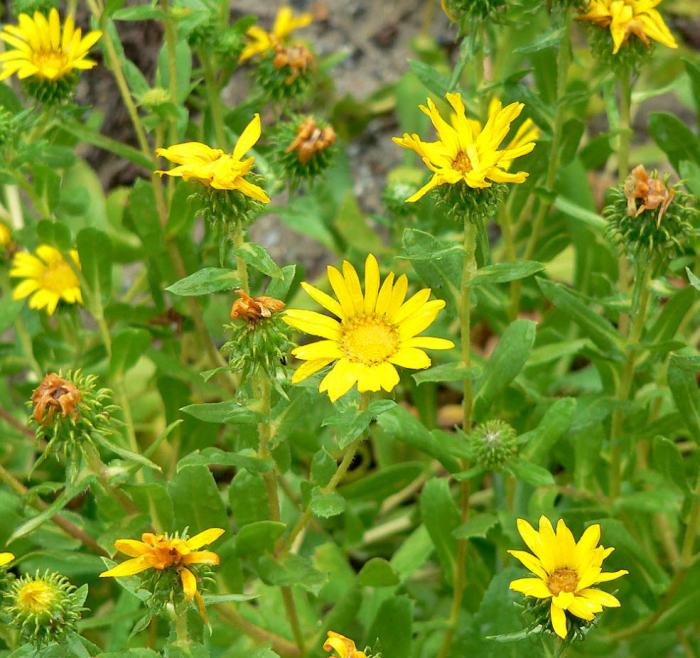
Grindelia stricta
Coastal Gumweed

Description
Grindelia stricta is a species of flowering plant in the Asteraceae (Sunflower) family known by the common names Coastal Gumweed and Oregon Gumweed. It is native to the west coast of North America from California to Alaska, where it is a resident of coastal plant communities such as those in marshes and beaches. In California, it is found from the Channel Islands northwards, typically in close proximity to the coast. This plant is variable in appearance, taking the form of a weed-like perennial herb forming low clumps to a sprawling subshrub growing erect to heights exceeding one meter. Its foliage and stems are green to rusty red or purplish and the plant may be hairy to hairless. The fleshy leaves are green, often with red edges and veining, and are up to 5" in length on large plants. The flower cluster holds one or more flower heads each up to 1" wide. The flower head is a cup of thick erect or recurved green phyllaries. Yellow disc florets fill the center of the flower head and there is a fringe of yellow ray florets around the circumference. The head produces copious white exudate, especially in the early stages of blooming. This exudate was used by native people as an adhesive. It does best in full or part sun in coastal areas with well draining, sandy soil. Does tolerate saline soil. Flowers attract butterflies. Deadhead to promote more blooms during spring, summer and fall. Can be 3-5' tall and 7' wide.
Plant Type
Perennial
Height Range
Under 1'
Width Range
1-3'
Flower Color
Yellow
Flower Season
Winter, Spring, Fall, Intermittent
Leaf Color
Green
Bark Color
n/a
Fruit Color
n/a
Fruit Season
n/a
Sun
Full, Half
Water
Very Low, Low
Growth Rate
Fast
Soil Type
Sandy
Soil Condition
Soil pH
Adverse Factors
Attracts Bees
Design Styles
Meadow, Mediterranean, Seascape
Accenting Features
Showy Flowers
Seasonal Interest
Winter, Spring, Summer, Fall
Location Uses
Perennial Border, With Rocks
Special Uses
Erosion Control, Filler, Mass Planting, Lawn Substitute
Attracts Wildlife
Hummingbirds, Butterflies
Water Saving Tip:
Change spray sprinklers to low-flow bubbler or drip systems.
Shrubs and trees are ideal candidates for this type of irrigation because the water is applied directly to the root zones.